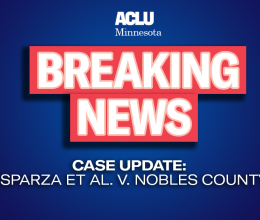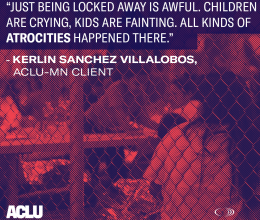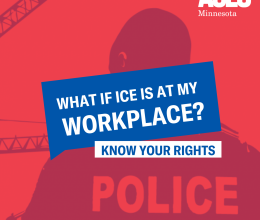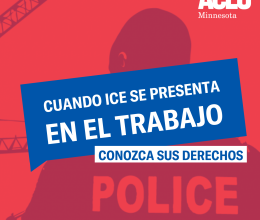ACLU of Minnesota summer intern Mohamed Camara is a sophomore at Sarah Lawrence College studying international relations, economics, and philosophy.
About eight years ago my family sought refuge in the United States from the social and political unrest in my country, Guinea. In the early 2000s, Guinea experienced a series of violent political movements. When I was five years old, a rebel group from Liberia attacked my hometown, Macenta. My mom, my siblings, and I fled to the countryside and left everything behind. No one from my family was hurt, but many of the people who lived by the frontier died during the invasion.
Although this external attack devastated the country, our own government's abuse of power was worse. Guinea became a socialist country in 1958, after its independence from France. In the first 50 years of its liberation (1958-2008), there were only two transfers of power. These transfers of power were not by democratic means, but because the leaders died in office. In response to the government's despotic nature, many anti-dictatorship groups emerged with the mission to make Guinea democratic. These groups, although with good intentions at times, were violent. The series of protests that took place in the early 2000s destroyed many businesses, homes, and public infrastructure around the country. As a result, the already struggling nation faced further economic stagnation, widespread starvation, and rise in criminality. This was in the first 12 years of my life.
In 2009 my family moved to the United States. My parent’s decision to seek asylum in the United States was not accidental. They believed in the virtues of justice and rule of law that America prides itself on. As a teenager, I went to an international school in the inner city of New York. My peers had immigrated to the United States from various corners of the globe. Just like me, my friends had come to this nation for the fairness of its justice system and the prospect of a better future promised to all who are willing to endeavor. My school, as well as my own commitment to high academic achievements, were grounded on the belief that education was a promising means to a better future.
President Trump's anti-immigration policies and divisive rhetoric have created an increasingly hostile environment. By attempting to ban Muslim immigrants from entering the United States, he has made it clear that he does not believe that certain people are deserving of being American. This hysteria and fear-mongering have dimmed the prospect for many immigrants to achieve the American dream that so many of us have longed for. The sense of alienation in a country that I have come to love as my own is dispiriting. The culture of criminalizing immigrants in the United States is not only dishonorable, but contradicts the very ethics that I learned this country was founded upon.
But, despite the odious ramifications of President Trump's immigration policies, the great philanthropic work that everyday Americans are doing is a sign for a more welcoming America in the future. Seeing young people, religious groups, and nationwide organizations (like the American Civil Liberties Union) joining hands with immigrants to protect them from unconstitutional policies attests to the vitality of our Constitution and the rule of law.
As President Trump plunges forward with his anti-immigration agenda, we must work tirelessly to keep alive our innate inclination towards justice and empathy for our fellow human beings. If we ought to make America a place of refuge for people in need, court battles against unconstitutional immigration laws alone will not suffice. We must change hearts and minds to see immigrants in a better light. We are stronger together and should do everything to remain so.




